Unit 5 Educational Exchanges Reading 课件(共40张PPT)
文档属性
| 名称 | Unit 5 Educational Exchanges Reading 课件(共40张PPT) |
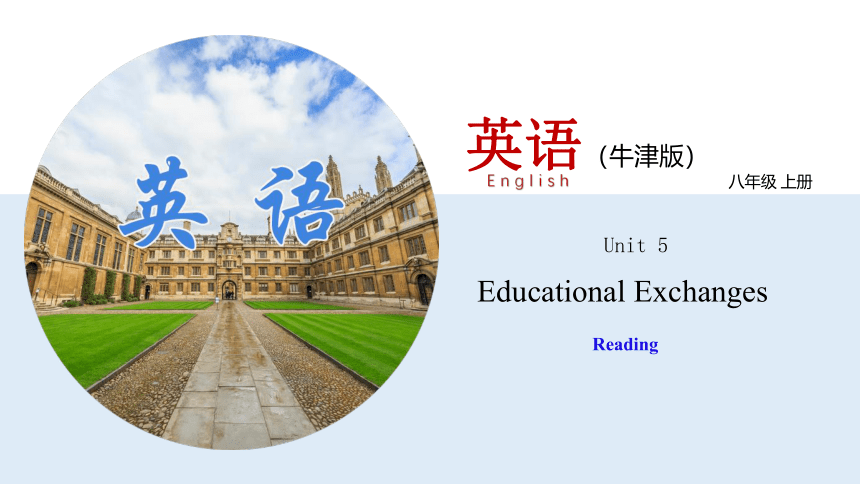
|
|
| 格式 | pptx | ||
| 文件大小 | 18.1MB | ||
| 资源类型 | 教案 | ||
| 版本资源 | 牛津深圳版 | ||
| 科目 | 英语 | ||
| 更新时间 | 2023-06-04 17:41:12 | ||
图片预览

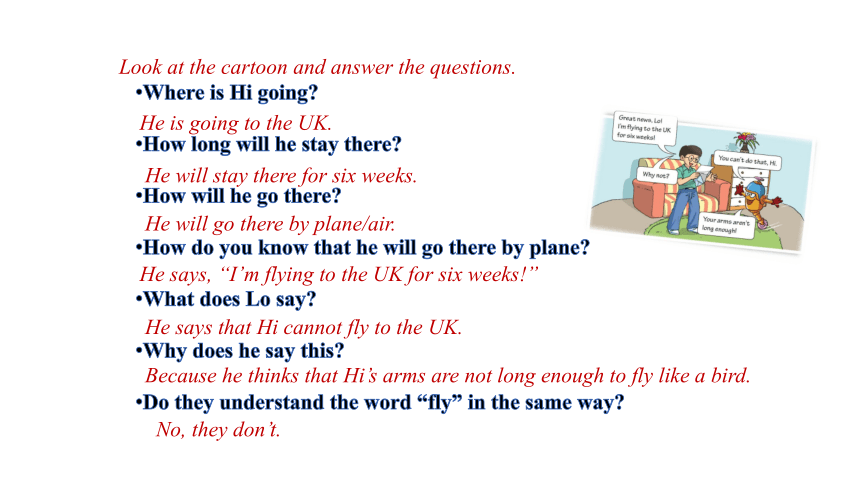
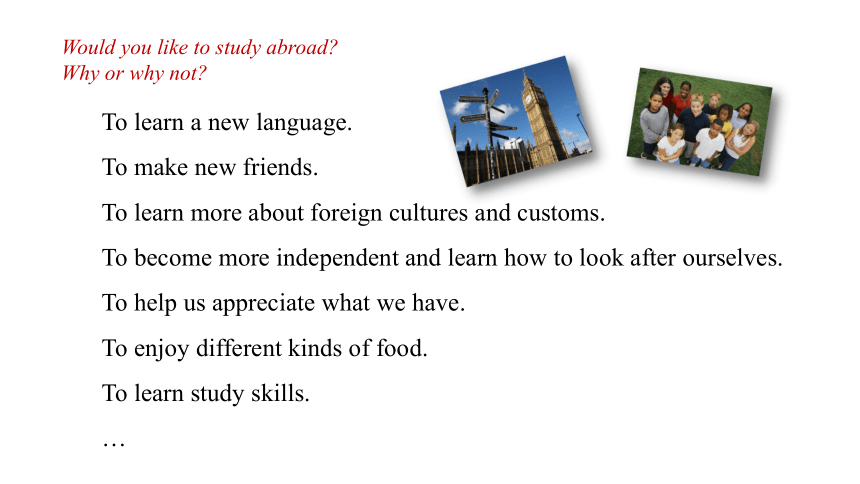
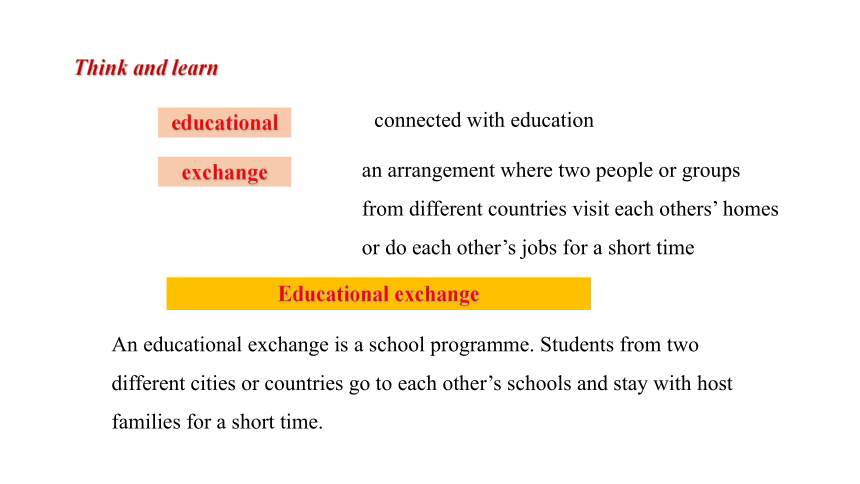
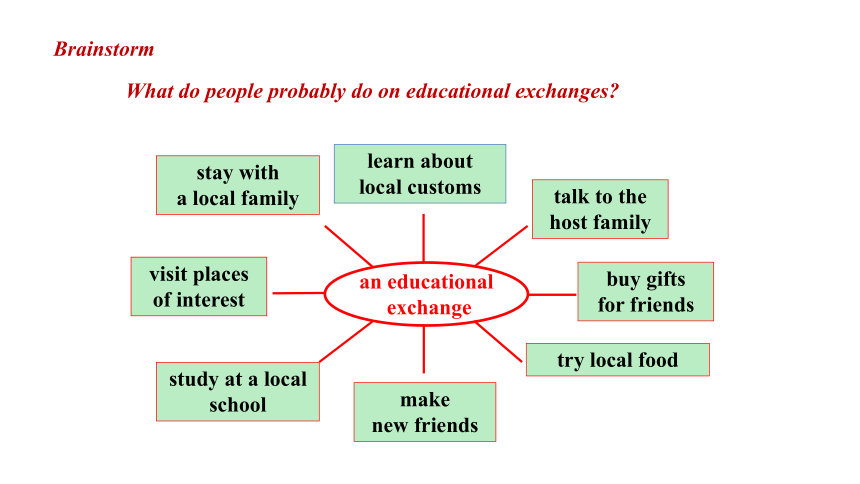


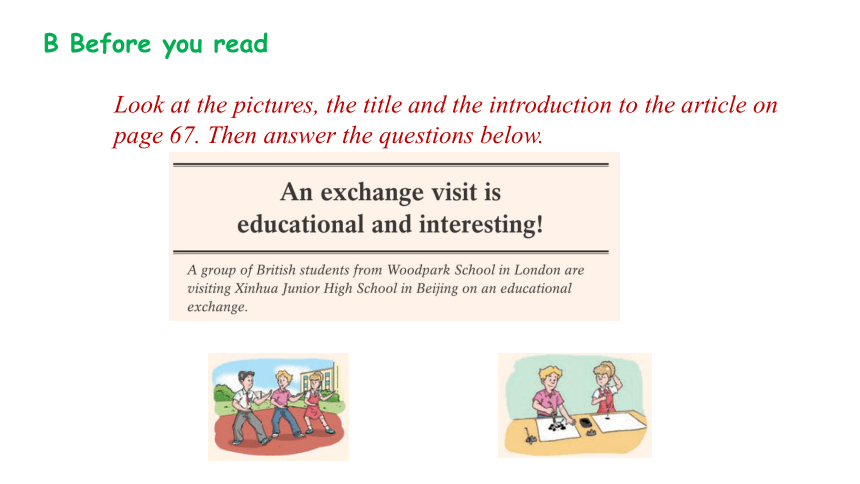
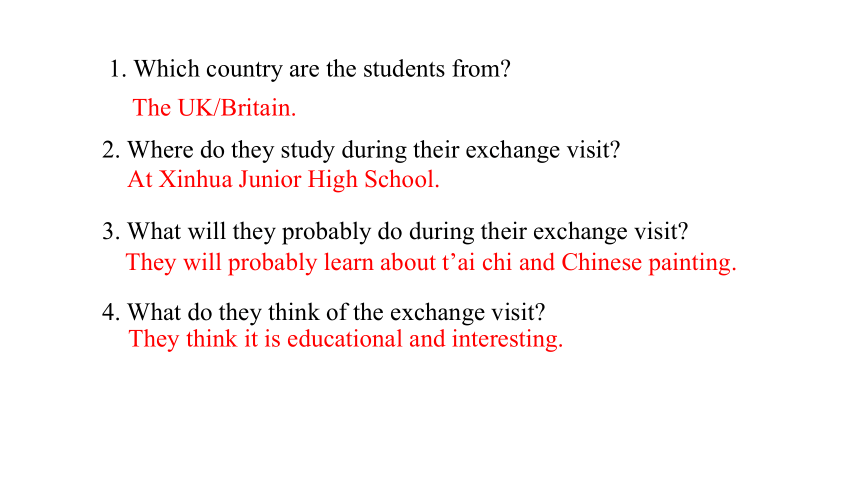
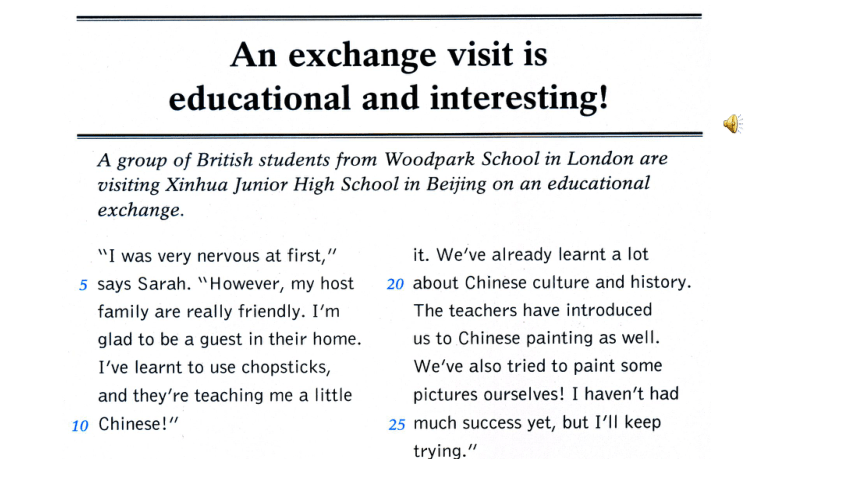
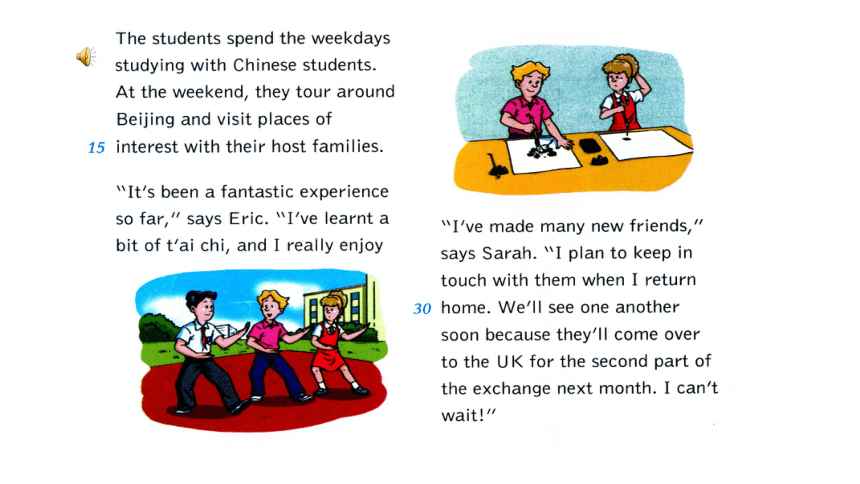
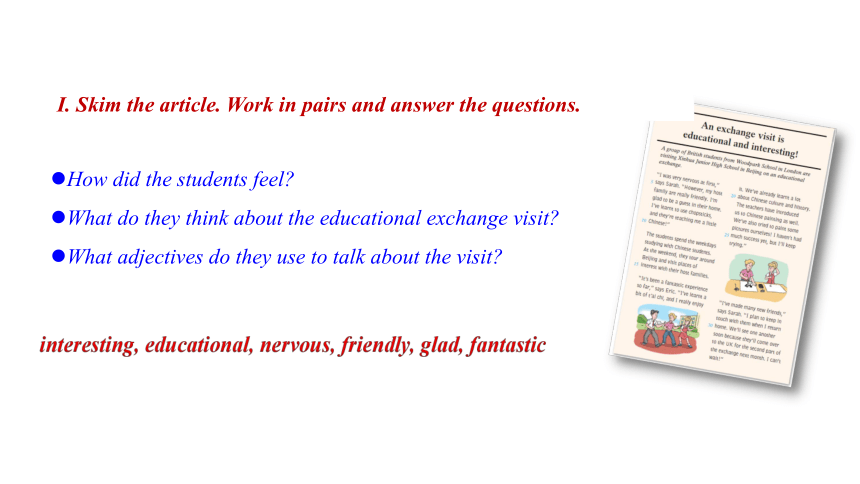
文档简介
(共40张PPT)
英语(牛津版)
八年级 上册
English
Reading
Educational Exchanges
Unit 5
Where is Hi going
How long will he stay there
How will he go there
How do you know that he will go there by plane
What does Lo say
Why does he say this
Do they understand the word “fly” in the same way
Look at the cartoon and answer the questions.
He is going to the UK.
He will stay there for six weeks.
He will go there by plane/air.
He says, “I’m flying to the UK for six weeks!”
He says that Hi cannot fly to the UK.
Because he thinks that Hi’s arms are not long enough to fly like a bird.
No, they don’t.
Would you like to study abroad
Why or why not
To learn a new language.
To make new friends.
To learn more about foreign cultures and customs.
To become more independent and learn how to look after ourselves.
To help us appreciate what we have.
To enjoy different kinds of food.
To learn study skills.
…
Think and learn
educational
Educational exchange
exchange
connected with education
an arrangement where two people or groups from different countries visit each others’ homes or do each other’s jobs for a short time
An educational exchange is a school programme. Students from two different cities or countries go to each other’s schools and stay with host families for a short time.
Brainstorm
What do people probably do on educational exchanges
an educational
exchange
learn about
local customs
talk to the
host family
buy gifts
for friends
try local food
make
new friends
study at a local school
visit places of interest
stay with
a local family
I stayed with a
______________ .
Eric is talking about his exchange visit to plete the sentences with the words from the box.
host family
A What do you know about ...
I visited a __________.
local school
Chinese culture host family local school new friends
I made some ____________ .
new friends
I learnt a lot about ____________.
Chinese culture
B Before you read
Look at the pictures, the title and the introduction to the article on page 67. Then answer the questions below.
1. Which country are the students from
2. Where do they study during their exchange visit
3. What will they probably do during their exchange visit
4. What do they think of the exchange visit
The UK/Britain.
At Xinhua Junior High School.
They will probably learn about t’ai chi and Chinese painting.
They think it is educational and interesting.
I. Skim the article. Work in pairs and answer the questions.
interesting, educational, nervous, friendly, glad, fantastic
How did the students feel
What do they think about the educational exchange visit
What adjectives do they use to talk about the visit
II. Skim the plete the table.
Who/What How
interesting, educational
nervous
friendly
glad
fantastic
the exchange visit
Sarah
Sarah’s host family
Sarah
Eric’s experience
III. Scan the article and answer the following questions.
What have the students done during the visit
learn to use chopsticks
learn a little Chinese
study with Chinese students
tour around Beijing and visit places of interest with their host families
learn t’ai chi
learn a lot about Chinese culture and history
learn about Chinese painting
make many new friends
IV. Read the article again and answer the following question.
A group of British students from Woodpark School in London are visiting Xinhua Junior High School in Beijing on an educational exchange.
We’ll see one another soon because they’ll come over to the UK for the second part of the exchange next month.
Why is it called an educational exchange visit
A group of students from France come to Beijing on an educational exchange.
Sarah has learnt a lot of Chinese while she is staying with her host family.
Sarah isn’t nervous any longer because her host family are friendly.
Sarah hopes to keep in touch with her new friends after she goes back home.
Some students from Xinhua Junior High School in Beijing will visit London
in two months.
Britain/London
True or false
V. Read the article and decide whether the statements are true (T) or false (F).
(F)
(F)
(T)
(T)
(F)
a little
next month
1. I am happy to meet you. I am ________ we met. (line 7)
2. A person who is invited to stay at another person’s home is a ________. (line 7)
3. Helen goes to school from Monday to Friday. She has classes on _____________. (line 11)
4. The cake was really excellent. It tasted ____________. (line 16)
5. Bob has got good exam results. His parents are proud of his __________. (line 25)
C1.The words in italics explain the meanings of some words on page 67. Find these words to complete the sentences.
glad
guest
weekdays
fantastic
success
C Vocabulary
C2.Complete the diary below with the words from the box.
culture
exchange
already
introduce
tour
experience
Reporter: Good morning. I’m a reporter from a student
newspaper. Can I ask you a few questions
Sarah: Sure.
Reporter: Why are you in Beijing
Sarah: (1)____________________________
Reporter: Which school do you come from
Sarah: (2) _____________________________
D Comprehension
I'm in Beijing on an educational exchange.
D1 A reporter from a student newspaper interviewed Sarah on campus. Read the article on page 67 and complete Sarah’s answers.
I come from Woodpark School in London.
Reporter: What do you and your classmates do in Beijing
Sarah: We spend the weekdays (3)_____________
_______________ At the weekend,
(4) ________________________________
___________________________________
Reporter: That’s great. I hope you enjoy the rest of your stay in
Beijing. Thank you and goodbye.
Sarah: You’re welcome. Bye.
studying with Chinese students.
we tour around Beijing and visit places of interest with our host families.
The educational exchange visit to Beijing went well last month. The host families were very friendly. They taught our students how to use (1) ___________. They also taught our students to speak (2) _________. Our students enjoyed their studies at the school. They learnt a lot about Chinese culture and history. They learnt some t’ai chi.
D2 Miss Wilson came to Beijing with the exchange students. Read the article again and complete her report below.
chopsticks
Chinese
They also learnt (3) ________________________. The student made (4) ______________________ in Beijing. They plan to keep in touch with them.
The Chinese students will come to our school for (5) _________________________________ next month. We need to get ready soon.
Chinese painting
many new friends
the second part of the exchange
educational
exchange culture
host
local
British
glad
guest
chopstick
weekday
adj. 有关教育的;有教育意义的 p.65
n. 交流;互访 p.65
n. 文化 p.66
n. 主人 p.66
adj. 地方的;当地的 p.66
adj. 英国的 p.67
adj. 高兴;愉快 p.67
n. 客人;宾客 p.67
n. 筷子 p.67
n. 工作日 p.67
New words
tour
fantastic
experience
*t’ai chi
already
introduce
success
yet
v. 在......旅游 p.67
adj. 极好的;了不起的 p.67
n. 经历;体验 p.67
n. 太极(拳) p.67
adv. 已经;早已 p.67
v. 使...初次了解...;使尝试 p.67
n. 成功 p.67
adv. 尚未;仍未 p.67
起初;起先 p.67
到目前为止;迄今为止 p.67
小量 p.67
使...初次了解...;
使尝试 p.67
(通常远距离地)从......到...... p.67
名胜
与……保持联系
互相
at first
so far
a bit of
introduce...to...
come over (to...)
*place of interest
*keep in touch with
*one another
Phrases
1. The students spend the weekdays studying with Chinese students.
这些学生平时和中国学生一起学习。
(1) spend意为“花(时间);度过”,常用搭配是spend some time (in) doing sth, 意为“花(时间)做某事”。如:
我花了两个小时读这个故事。I spent two hours reading the story.
spend还可意为“花(钱)”。如:
我花了约4,500元去泰国旅游。
I spent about 4,500 yuan travelling to Thailand.
(2) weekday n. 工作日 Weekday—from Monday to Friday
在工作日我爸爸很忙。 My father is very busy on weekdays.
2. At the weekend, they tour around Beijing and visit places of interest with their host families.
周末他们和寄宿家庭一起游览北京,参观名胜。
tour v. 在......旅游 n. 旅游
tourist n. 旅游者;观光者
go on a tour 去旅行
我们到苏格兰各处游览了一番。
We went on a tour of Scotland.
辨析tour, journey ,trip ,travel
tour是类似周游、观光旅游的旅行,
比如tour of London, tour of World,一般短语就是on the tour of some place.
journey是着重于行程时间比较长的旅行,较正式,
比如我们在飞机上常常看到Wish you have a good
journey. ;另外journey还强调抽象的“旅程”的意思,比如: Life is a journey.
trip是有目的性的旅行,强调“短期旅行”,但实际上口语上trip和journey是可以互换的。
travel的意思就很广泛了,算是一个总称,着重于“离开居住地去其他地方作短途旅行”。
3. “It’s been a fantastic experience so far,” says Eric.
埃里克说:“到目前为止,这是一次很棒的经历。”
(1) fantastic adj. 极好的;了不起的
你今天气色很好!
You look fantastic today!
你做的这顿饭太丰盛了!
The meal you cooked is fantastic!
(2) experience n. 经历;体验
v.体验;经历
当“经验”的意思的时候是不可数名词,当“经历”的意思时是可数名词。
经验是最好的老师。 Experience is the best teacher.
那是一次不愉快的经历。 That was an unhappy experience.
你体验过艰苦吗? Have you experienced the hardship
(3) so far 到目前为止;迄今为止
可与up to now互换使用,常用于现在完成时的句子中。例如:
到目前为止,我见过那个老人三次。
I have seen the old man three times so far/ up to now.
4. I’ve learnt a bit of t’ai chi, and I really enjoy it.
我学了一点太极拳,并且我非常喜欢它。
(1) a bit of 意为“一点;小量”,后接不可数名词。a bit 意为“一点”,用于修饰动词、形容词和比较级。
【拓展】a little 也意为“一点”,可以直接修饰不可数名词、动词、形容词和比较级。例如:
我现在还有点时间。 I still have a bit of / a little time now.
你能把电视机关小声点吗?
Could you please turn down the TV a bit / a little
我觉得有点害怕。 I feel a bit / a little afraid.
5. The teachers have introduced us to Chinese painting as well. We’ve also tried to paint some pictures ourselves!
老师们也让我们初次了解了中国国画。我们自己也努力画过一些图画。
(1) introduce v. 介绍
introduction n. 介绍书,说明书
introduce...to... 使...初次了解...;使尝试
您能向我们的读者介绍一下贵学校吗
Can you introduce to our readers about your school
(2) as well 和also均意为“也”,too和either也有“也”的意思,注意它们的用法和区别:
(1) as well 用于肯定句,常用于口语中,通常位于句末,与前面的句子一般不用逗号分开;
(2) also 用于肯定句,通常位于be 动词、助动词或情态动词之后,行为动词之前;
(3) too 用于肯定句,比also 更通俗,一般放在句末,可用逗号与前面的句子分开;
(4) either 用于否定句,而且只能放在句末。
例如:
这事我也能做。I can also do it.= I can do it(,) too.= I can do it as well.
这事我也做不了。I can’t do it either.
6.I haven’t had much success yet, but I’ll keep trying.
我还没画过一副像样的画,但我会不断尝试。
(1) success n. 成功
successful adj. 成功的
successfully adv. 成功地
success为名词时,还可意为“成功的人或事”,为可数名词,其复数形式为successes
祝你学业有成。
I wish you success with your studies.
他的书是一个很大的成功。
His book is a great success.
(2) yet adv. 尚未,仍未
yet 一般放在否定或者疑问句中
already 放在肯定句中, “已经”的意思。
still 放在肯定句中 “依然”的意思
他还没完成作业。
He hasn’t finish his homework yet.
我还没吃完饭。
I didn’t have my supper yet.
(3) keep doing sth 不断做某事;一直做某事
他们一直在谈论那个女孩。
They kept talking about that girl.
7. We’ll see one another soon because they’ll come over to the UK for the second part of the exchange next month.
我们不久又能再相见了,因为作为教育交流的另一部分,他们将在下月到英国来。
(1) one another 互相
我们互相了解了很多。
We’ve learnt a lot about one another.
(2) come over (to...) (通常远距离地) 从...到...
他不远万里来中国度暑假。
He has come over to China for the summer.
(3) for the second part of 作为……的另一部分
We have read an article about an educational exchange.
We have learned some useful words and expressions in the Reading
一、根据句意,用所给单词的正确形式填空。
1. The Americans spell some words differently from the _________(Britain) people.
2. He usually talks to his students in a ________(friend) way.
3. His new book is a great _________(successful). A large number of readers enjoy it.
4. We watched a _________(fantasy) play yesterday evening.
5. It was the most _________(education) lesson I have ever had. I learnt a lot from it.
British
friendly
success
fantastic
educational
1. 我们今天下午要去看电影。你何不也一起来呢?
We’re going to see a film this afternoon. Why don’t you come along _____ _____
2. 我们现在通过写信与他保持联系。
We now _____ _____ _____ _____him by writing letters.
3. 他们坐了两个小时,没有互相交谈。
They sat for two hours without talking to _________ _________.
4. 起初很容易,但现在我们陷入了困境。
It was easy _____ _____, but we are in trouble now.
5. 她每月都存一点钱。
She sets aside _____ _____ _____ money every month.
二、根据中文意思完成句子。
as well
keep in touch with
each other/
one another
at first
a bit of
三、选择最佳答案填空。
( )1. I often feel ____ shy when I talk to strangers.
A. little B. a bit of C. a bit D. a little of
( )2. They spent two years ____ this bridge.
A. building B. to build C. built D. build
( )3. It will be a wonderful world if all nations live in peace with__.
A. other B. another C. together D. one another
( )4. Working hard is one of the keys to ____.
A. succeed B. success C. successful D. successfully
( )5. — How was your trip to Tibet — We enjoyed ____ very much.
A. us B. we C. ourselves D. ours
C
A
D
B
C
英语(牛津版)
八年级 上册
English
Reading
Educational Exchanges
Unit 5
Where is Hi going
How long will he stay there
How will he go there
How do you know that he will go there by plane
What does Lo say
Why does he say this
Do they understand the word “fly” in the same way
Look at the cartoon and answer the questions.
He is going to the UK.
He will stay there for six weeks.
He will go there by plane/air.
He says, “I’m flying to the UK for six weeks!”
He says that Hi cannot fly to the UK.
Because he thinks that Hi’s arms are not long enough to fly like a bird.
No, they don’t.
Would you like to study abroad
Why or why not
To learn a new language.
To make new friends.
To learn more about foreign cultures and customs.
To become more independent and learn how to look after ourselves.
To help us appreciate what we have.
To enjoy different kinds of food.
To learn study skills.
…
Think and learn
educational
Educational exchange
exchange
connected with education
an arrangement where two people or groups from different countries visit each others’ homes or do each other’s jobs for a short time
An educational exchange is a school programme. Students from two different cities or countries go to each other’s schools and stay with host families for a short time.
Brainstorm
What do people probably do on educational exchanges
an educational
exchange
learn about
local customs
talk to the
host family
buy gifts
for friends
try local food
make
new friends
study at a local school
visit places of interest
stay with
a local family
I stayed with a
______________ .
Eric is talking about his exchange visit to plete the sentences with the words from the box.
host family
A What do you know about ...
I visited a __________.
local school
Chinese culture host family local school new friends
I made some ____________ .
new friends
I learnt a lot about ____________.
Chinese culture
B Before you read
Look at the pictures, the title and the introduction to the article on page 67. Then answer the questions below.
1. Which country are the students from
2. Where do they study during their exchange visit
3. What will they probably do during their exchange visit
4. What do they think of the exchange visit
The UK/Britain.
At Xinhua Junior High School.
They will probably learn about t’ai chi and Chinese painting.
They think it is educational and interesting.
I. Skim the article. Work in pairs and answer the questions.
interesting, educational, nervous, friendly, glad, fantastic
How did the students feel
What do they think about the educational exchange visit
What adjectives do they use to talk about the visit
II. Skim the plete the table.
Who/What How
interesting, educational
nervous
friendly
glad
fantastic
the exchange visit
Sarah
Sarah’s host family
Sarah
Eric’s experience
III. Scan the article and answer the following questions.
What have the students done during the visit
learn to use chopsticks
learn a little Chinese
study with Chinese students
tour around Beijing and visit places of interest with their host families
learn t’ai chi
learn a lot about Chinese culture and history
learn about Chinese painting
make many new friends
IV. Read the article again and answer the following question.
A group of British students from Woodpark School in London are visiting Xinhua Junior High School in Beijing on an educational exchange.
We’ll see one another soon because they’ll come over to the UK for the second part of the exchange next month.
Why is it called an educational exchange visit
A group of students from France come to Beijing on an educational exchange.
Sarah has learnt a lot of Chinese while she is staying with her host family.
Sarah isn’t nervous any longer because her host family are friendly.
Sarah hopes to keep in touch with her new friends after she goes back home.
Some students from Xinhua Junior High School in Beijing will visit London
in two months.
Britain/London
True or false
V. Read the article and decide whether the statements are true (T) or false (F).
(F)
(F)
(T)
(T)
(F)
a little
next month
1. I am happy to meet you. I am ________ we met. (line 7)
2. A person who is invited to stay at another person’s home is a ________. (line 7)
3. Helen goes to school from Monday to Friday. She has classes on _____________. (line 11)
4. The cake was really excellent. It tasted ____________. (line 16)
5. Bob has got good exam results. His parents are proud of his __________. (line 25)
C1.The words in italics explain the meanings of some words on page 67. Find these words to complete the sentences.
glad
guest
weekdays
fantastic
success
C Vocabulary
C2.Complete the diary below with the words from the box.
culture
exchange
already
introduce
tour
experience
Reporter: Good morning. I’m a reporter from a student
newspaper. Can I ask you a few questions
Sarah: Sure.
Reporter: Why are you in Beijing
Sarah: (1)____________________________
Reporter: Which school do you come from
Sarah: (2) _____________________________
D Comprehension
I'm in Beijing on an educational exchange.
D1 A reporter from a student newspaper interviewed Sarah on campus. Read the article on page 67 and complete Sarah’s answers.
I come from Woodpark School in London.
Reporter: What do you and your classmates do in Beijing
Sarah: We spend the weekdays (3)_____________
_______________ At the weekend,
(4) ________________________________
___________________________________
Reporter: That’s great. I hope you enjoy the rest of your stay in
Beijing. Thank you and goodbye.
Sarah: You’re welcome. Bye.
studying with Chinese students.
we tour around Beijing and visit places of interest with our host families.
The educational exchange visit to Beijing went well last month. The host families were very friendly. They taught our students how to use (1) ___________. They also taught our students to speak (2) _________. Our students enjoyed their studies at the school. They learnt a lot about Chinese culture and history. They learnt some t’ai chi.
D2 Miss Wilson came to Beijing with the exchange students. Read the article again and complete her report below.
chopsticks
Chinese
They also learnt (3) ________________________. The student made (4) ______________________ in Beijing. They plan to keep in touch with them.
The Chinese students will come to our school for (5) _________________________________ next month. We need to get ready soon.
Chinese painting
many new friends
the second part of the exchange
educational
exchange culture
host
local
British
glad
guest
chopstick
weekday
adj. 有关教育的;有教育意义的 p.65
n. 交流;互访 p.65
n. 文化 p.66
n. 主人 p.66
adj. 地方的;当地的 p.66
adj. 英国的 p.67
adj. 高兴;愉快 p.67
n. 客人;宾客 p.67
n. 筷子 p.67
n. 工作日 p.67
New words
tour
fantastic
experience
*t’ai chi
already
introduce
success
yet
v. 在......旅游 p.67
adj. 极好的;了不起的 p.67
n. 经历;体验 p.67
n. 太极(拳) p.67
adv. 已经;早已 p.67
v. 使...初次了解...;使尝试 p.67
n. 成功 p.67
adv. 尚未;仍未 p.67
起初;起先 p.67
到目前为止;迄今为止 p.67
小量 p.67
使...初次了解...;
使尝试 p.67
(通常远距离地)从......到...... p.67
名胜
与……保持联系
互相
at first
so far
a bit of
introduce...to...
come over (to...)
*place of interest
*keep in touch with
*one another
Phrases
1. The students spend the weekdays studying with Chinese students.
这些学生平时和中国学生一起学习。
(1) spend意为“花(时间);度过”,常用搭配是spend some time (in) doing sth, 意为“花(时间)做某事”。如:
我花了两个小时读这个故事。I spent two hours reading the story.
spend还可意为“花(钱)”。如:
我花了约4,500元去泰国旅游。
I spent about 4,500 yuan travelling to Thailand.
(2) weekday n. 工作日 Weekday—from Monday to Friday
在工作日我爸爸很忙。 My father is very busy on weekdays.
2. At the weekend, they tour around Beijing and visit places of interest with their host families.
周末他们和寄宿家庭一起游览北京,参观名胜。
tour v. 在......旅游 n. 旅游
tourist n. 旅游者;观光者
go on a tour 去旅行
我们到苏格兰各处游览了一番。
We went on a tour of Scotland.
辨析tour, journey ,trip ,travel
tour是类似周游、观光旅游的旅行,
比如tour of London, tour of World,一般短语就是on the tour of some place.
journey是着重于行程时间比较长的旅行,较正式,
比如我们在飞机上常常看到Wish you have a good
journey. ;另外journey还强调抽象的“旅程”的意思,比如: Life is a journey.
trip是有目的性的旅行,强调“短期旅行”,但实际上口语上trip和journey是可以互换的。
travel的意思就很广泛了,算是一个总称,着重于“离开居住地去其他地方作短途旅行”。
3. “It’s been a fantastic experience so far,” says Eric.
埃里克说:“到目前为止,这是一次很棒的经历。”
(1) fantastic adj. 极好的;了不起的
你今天气色很好!
You look fantastic today!
你做的这顿饭太丰盛了!
The meal you cooked is fantastic!
(2) experience n. 经历;体验
v.体验;经历
当“经验”的意思的时候是不可数名词,当“经历”的意思时是可数名词。
经验是最好的老师。 Experience is the best teacher.
那是一次不愉快的经历。 That was an unhappy experience.
你体验过艰苦吗? Have you experienced the hardship
(3) so far 到目前为止;迄今为止
可与up to now互换使用,常用于现在完成时的句子中。例如:
到目前为止,我见过那个老人三次。
I have seen the old man three times so far/ up to now.
4. I’ve learnt a bit of t’ai chi, and I really enjoy it.
我学了一点太极拳,并且我非常喜欢它。
(1) a bit of 意为“一点;小量”,后接不可数名词。a bit 意为“一点”,用于修饰动词、形容词和比较级。
【拓展】a little 也意为“一点”,可以直接修饰不可数名词、动词、形容词和比较级。例如:
我现在还有点时间。 I still have a bit of / a little time now.
你能把电视机关小声点吗?
Could you please turn down the TV a bit / a little
我觉得有点害怕。 I feel a bit / a little afraid.
5. The teachers have introduced us to Chinese painting as well. We’ve also tried to paint some pictures ourselves!
老师们也让我们初次了解了中国国画。我们自己也努力画过一些图画。
(1) introduce v. 介绍
introduction n. 介绍书,说明书
introduce...to... 使...初次了解...;使尝试
您能向我们的读者介绍一下贵学校吗
Can you introduce to our readers about your school
(2) as well 和also均意为“也”,too和either也有“也”的意思,注意它们的用法和区别:
(1) as well 用于肯定句,常用于口语中,通常位于句末,与前面的句子一般不用逗号分开;
(2) also 用于肯定句,通常位于be 动词、助动词或情态动词之后,行为动词之前;
(3) too 用于肯定句,比also 更通俗,一般放在句末,可用逗号与前面的句子分开;
(4) either 用于否定句,而且只能放在句末。
例如:
这事我也能做。I can also do it.= I can do it(,) too.= I can do it as well.
这事我也做不了。I can’t do it either.
6.I haven’t had much success yet, but I’ll keep trying.
我还没画过一副像样的画,但我会不断尝试。
(1) success n. 成功
successful adj. 成功的
successfully adv. 成功地
success为名词时,还可意为“成功的人或事”,为可数名词,其复数形式为successes
祝你学业有成。
I wish you success with your studies.
他的书是一个很大的成功。
His book is a great success.
(2) yet adv. 尚未,仍未
yet 一般放在否定或者疑问句中
already 放在肯定句中, “已经”的意思。
still 放在肯定句中 “依然”的意思
他还没完成作业。
He hasn’t finish his homework yet.
我还没吃完饭。
I didn’t have my supper yet.
(3) keep doing sth 不断做某事;一直做某事
他们一直在谈论那个女孩。
They kept talking about that girl.
7. We’ll see one another soon because they’ll come over to the UK for the second part of the exchange next month.
我们不久又能再相见了,因为作为教育交流的另一部分,他们将在下月到英国来。
(1) one another 互相
我们互相了解了很多。
We’ve learnt a lot about one another.
(2) come over (to...) (通常远距离地) 从...到...
他不远万里来中国度暑假。
He has come over to China for the summer.
(3) for the second part of 作为……的另一部分
We have read an article about an educational exchange.
We have learned some useful words and expressions in the Reading
一、根据句意,用所给单词的正确形式填空。
1. The Americans spell some words differently from the _________(Britain) people.
2. He usually talks to his students in a ________(friend) way.
3. His new book is a great _________(successful). A large number of readers enjoy it.
4. We watched a _________(fantasy) play yesterday evening.
5. It was the most _________(education) lesson I have ever had. I learnt a lot from it.
British
friendly
success
fantastic
educational
1. 我们今天下午要去看电影。你何不也一起来呢?
We’re going to see a film this afternoon. Why don’t you come along _____ _____
2. 我们现在通过写信与他保持联系。
We now _____ _____ _____ _____him by writing letters.
3. 他们坐了两个小时,没有互相交谈。
They sat for two hours without talking to _________ _________.
4. 起初很容易,但现在我们陷入了困境。
It was easy _____ _____, but we are in trouble now.
5. 她每月都存一点钱。
She sets aside _____ _____ _____ money every month.
二、根据中文意思完成句子。
as well
keep in touch with
each other/
one another
at first
a bit of
三、选择最佳答案填空。
( )1. I often feel ____ shy when I talk to strangers.
A. little B. a bit of C. a bit D. a little of
( )2. They spent two years ____ this bridge.
A. building B. to build C. built D. build
( )3. It will be a wonderful world if all nations live in peace with__.
A. other B. another C. together D. one another
( )4. Working hard is one of the keys to ____.
A. succeed B. success C. successful D. successfully
( )5. — How was your trip to Tibet — We enjoyed ____ very much.
A. us B. we C. ourselves D. ours
C
A
D
B
C
